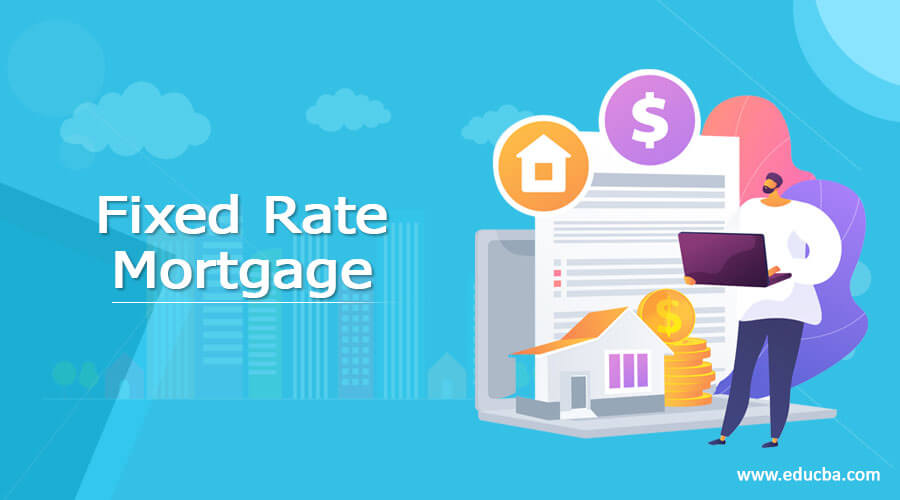
What is a Fixed Rate Mortgage?
The term “fixed-rate mortgage” refers to the type of loan in which the interest rate doesn’t change during the entire loan tenure. Unlike variable and adjustable-rate mortgages, a fixed-rate mortgage carries the same interest rate over the loan’s real life and doesn’t fluctuate with the market.
In other words, the interest rate in the case of a fixed-rate mortgage remains the same irrespective of whether interest rates in the market increase or decrease. Typically, borrowers prefer fixed rates for long-term mortgage loans to predict future costs and payments accurately.
Key Takeaways
Some of the key takeaways of the article are:
- As the name suggests, it is a loan whose interest rate remains unchanged for the entire term. In other words, the interest rate doesn’t fluctuate with the market conditions.
- Borrowers who seek better predictability of future payments and are willing to hold the underlying property longer tend to prefer fixed-rate mortgages.
- It considers the best option in an increasing interest rate environment as there is no need to pay extra interest.
How Does Fixed Rate Mortgage Work?
The choice of a fixed-rate mortgage depends on loan tenure and the current interest rate environment. This is immune to any changes in the economy, which is desirable in the case of a long-term loan. Let us understand the concept in more detail with the help of the following illustration.
Let us assume that the current interest rate in the market is low but is expected to surge shortly. In such a scenario, it is favored over a variable-rate mortgage as the former locks the loan at the prevailing lower interest rate. It protects the mortgagor from increased interest expense due to future changes. However, if the interest rate in the market is expected to go down, then taking a fixed-rate mortgage will become an expensive option.
Types of Fixed Rate Mortgage
The following are the most common types of fixed-rate mortgage loans:
- 30-year fixed rate mortgage: It is the most popular choice for mortgagors as the long tenure of the loan means that the periodic payments are relatively low, even with a slightly higher interest rate. However, the mortgagors can save more on interest expenses using a shorter-term loan.
- 15-year fixed rate mortgage: The borrowers who opt for a 15-year fixed rate mortgage can save quite a bit of money on interest. The savings happen for two reasons – 15-year mortgages are typically available at lower interest rates than 30-year mortgages, and the shorter amortization period results in lower interest payouts. The second point holds good even when the interest rates are the same on both 15-year and 30-year mortgages.
How are Fixed Rates Determined?
Typically, the fixed rates have maintained a touch higher than the yield of the 30-year Treasury bonds prevalent at the time of the mortgage issuance. The reason is that these mortgages are traded in the secondary market by investors who look for slightly higher returns than Treasury bonds without assuming any additional risk. As of September 27, 2021, the average 30-year mortgage rate is 3.37%, and the 15-year mortgage rate is 2.81%.
Alternatives
The most popular alternative is an adjustable-rate mortgage in which the interest rate changes over time. Of course, the borrower would pay more with an adjustable-rate mortgage if the interest rate in the market increases over the period. However, in a falling interest rate environment, the borrower would save quite a bit on the monthly payments.
Advantages
Some of the significant advantages are as follows:
- Since the payments remain unaffected by the movements in the market in these types of mortgages, the borrowers can predict the payments well in advance and plan the cash outflow accordingly.
- Most fixed-rate mortgages don’t have prepayment penalties, which enhances the ease of paying back the principal. This means the borrowers can repay more than the scheduled payments without extra fees or penalties.
- It is the best option in an increasing interest rate environment as there is no need to pay any extra interest, even when the loan market is at its worst.
Disadvantages
Some of the major disadvantages are as follows:
- These mortgages can be more expensive than other loan options as the former involves different closing costs, such as underwriting and origination fees.
- The interest rates charged for fixed-rate mortgages are relatively higher than the other loan options.
- It isn’t easy to qualify for a fixed-rate mortgage. An individual with a poor credit rating might find it challenging to secure a good deal or even grab one.
Conclusion
So, it can be seen that a fixed-rate mortgage is excellent for the stability of cash outflow. It makes a lot of sense in a volatile market situation as the borrower doesn’t need to worry about the impact of changing economic conditions on periodic payments. Ultimately, the mortgage loan choice largely depends on the borrower’s financial situation and desire for regular future payments.
Recommended Articles
This is a guide to Fixed Rate mortgages. Here we also discuss the definition, working, types, alternatives, advantages, and disadvantages. You may also have a look at the following articles to learn more –
